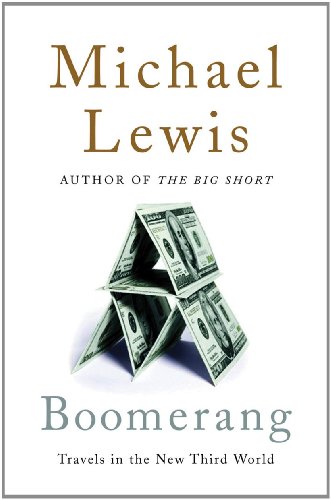Boomerang: Travels in the New Third World
Business & Investing, Michael Lewis
Boomerang: Travels in the New Third World par Michael Lewis ont été vendues pour EUR 8,09 chaque exemplaire. Le livre publié par W. W. Norton & Company. Il contient 212 pages et classé dans le genre genre. Ce livre a une bonne réponse du lecteur, il a la cote 4.5 des lecteurs 275. Inscrivez-vous maintenant pour accéder à des milliers de livres disponibles pour téléchargement gratuit. L'inscription était gratuite.
Moyenne des commentaires client : 4.5 étoiles sur 5 275 commentaires clientLa taille du fichier : 20.69 MB
Michael Lewis Boomerang: Travels in the New Third World livre pdf - As Pogo once said, "We have met the enemy and he is us."
The tsunami of cheap credit that rolled across the planet between 2002 and 2008 was more than a simple financial phenomenon: it was temptation, offering entire societies the chance to reveal aspects of their characters they could not normally afford to indulge.
Icelanders wanted to stop fishing and become investment bankers. The Greeks wanted to turn their country into a piñata stuffed with cash and allow as many citizens as possible to take a whack at it. The Germans wanted to be even more German; the Irish wanted to stop being Irish.
Michael Lewis's investigation of bubbles beyond our shores is so brilliantly, sadly hilarious that it leads the American reader to a comfortable complacency: oh, those foolish foreigners. But when he turns a merciless eye on California and Washington, DC, we see that the narrative is a trap baited with humor, and we understand the reckoning that awaits the greatest and greediest of debtor nations.As Pogo once said, "We have met the enemy and he is us."
The tsunami of cheap credit that rolled across the planet between 2002 and 2008 was more than a simple financial phenomenon: it was temptation, offering entire societies the chance to reveal aspects of their characters they could not normally afford to indulge.
Icelanders wanted to stop fishing and become investment bankers. The Greeks wanted to turn their country into a piñata stuffed with cash and allow as many citizens as possible to take a whack at it. The Germans wanted to be even more German; the Irish wanted to stop being Irish.
Michael Lewis's investigation of bubbles beyond our shores is so brilliantly, sadly hilarious that it leads the American reader to a comfortable complacency: oh, those foolish foreigners. But when he turns a merciless eye on California and Washington, DC, we see that the narrative is a trap baited with humor, and we understand the reckoning that awaits the greatest and greediest of debtor nations.Rang parmi les ventes Amazon: #24897 dans eBooksPublié le: 2011-09-28Sorti le: 2011-09-28Format: Ebook KindlePrésentation de l'éditeurAs Pogo once said, "We have met the enemy and he is us."The tsunami of cheap credit that rolled across the planet between 2002 and 2008 was more than a simple financial phenomenon: it was temptation, offering entire societies the chance to reveal aspects of their characters they could not normally afford to indulge.Icelanders wanted to stop fishing and become investment bankers. The Greeks wanted to turn their country into a piñata stuffed with cash and allow as many citizens as possible to take a whack at it. The Germans wanted to be even more German; the Irish wanted to stop being Irish.Michael Lewis's investigation of bubbles beyond our shores is so brilliantly, sadly hilarious that it leads the American reader to a comfortable complacency: oh, those foolish foreigners. But when he turns a merciless eye on California and Washington, DC, we see that the narrative is a trap baited with humor, and we understand the reckoning that awaits the greatest and greediest of debtor nations.Présentation de l'éditeurAs Pogo once said, "We have met the enemy and he is us."The tsunami of cheap credit that rolled across the planet between 2002 and 2008 was more than a simple financial phenomenon: it was temptation, offering entire societies the chance to reveal aspects of their characters they could not normally afford to indulge.Icelanders wanted to stop fishing and become investment bankers. The Greeks wanted to turn their country into a piñata stuffed with cash and allow as many citizens as possible to take a whack at it. The Germans wanted to be even more German; the Irish wanted to stop being Irish.Michael Lewis's investigation of bubbles beyond our shores is so brilliantly, sadly hilarious that it leads the American reader to a comfortable complacency: oh, those foolish foreigners. But when he turns a merciless eye on California and Washington, DC, we see that the narrative is a trap baited with humor, and we understand the reckoning that awaits the greatest and greediest of debtor nations.Biographie de l'auteurMichael Lewis is the author of Boomerang, The Big Short, Panic!, Liar’s Poker, The New New Thing, Moneyball, The Blind Side, and Home Game, among other works. He lives in Berkeley, California.Dylan Baker's films include Happiness, Along Came A Spider, and 13 Days. He starred on the TV series Feds and Murder One. Mr. Baker's theater credits include La Bete (Tony & Drama Desk nominations), Eastern Standard (Theatre World Award), and Not About Heroes (Obie Award).Vous trouverez ci-dessous les commentaires du lecteur après avoir lu Boomerang: Travels in the New Third World. Vous pouvez considérer pour votre référence.
1 internautes sur 2 ont trouvé ce commentaire utile.excellentPar Henri FrederixCe livre contient 5 chapitres : Islande, Irlande, Grèce, Allemagne et USA.Chacun de ceux-ci brosse un tableau très intéressant des principaux facteurs qui ont provoqué une crise financière nationale.Michael Lewis mélange, avec bonheur,considérations sociales et psychologiques, culture nationale et ambitions financières...

de Michael Lewis
4.5 étoiles sur 5 (275 Commentaires client)
Nom de fichier : boomerang-travels-in-the-new-third-world.pdf
Si vous avez un intérêt pour Boomerang: Travels in the New Third World, vous pouvez également lire un livre similaire tel que cc Against the Gods: The Remarkable Story of Risk

No comments:
Post a Comment